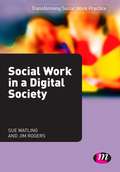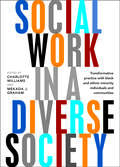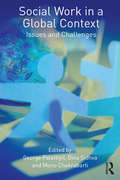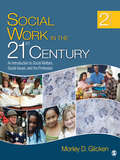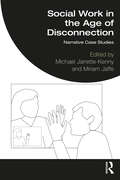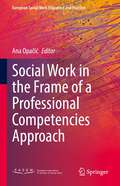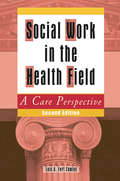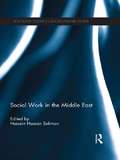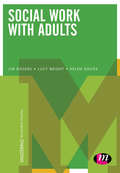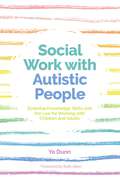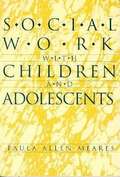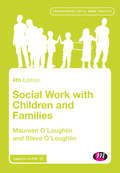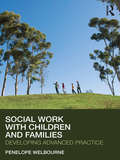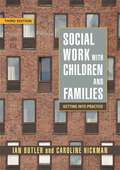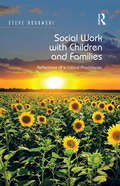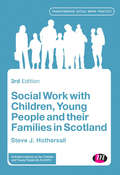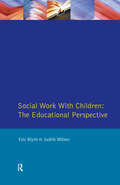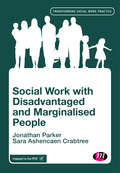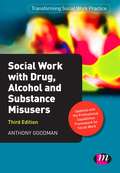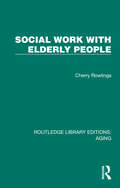- Table View
- List View
Social Work in a Changing Scotland (Student Social Work)
by Mark Smith Viviene E. CreeScotland has changed, politically and culturally, in recent years, with persistent demands for independence culminating in a referendum in 2014. On this fluid political landscape, social welfare can be co-opted towards a wider ‘nation-building’ project. As a result, social work in Scotland is increasingly divergent from the rest of the UK. This book offers a comprehensive, critical and timely account of the profession in these changing times, charting its historical development, current practice and future directions. Bringing together a range of academic and practice experts, it considers social work as it is currently but also as it might be. Divided into three parts, the first part sets a context, identifying historical, philosophical, policy and legal influences on current practice. The second part picks up on current themes in policy and practice, addressing key issues of professional identity in an increasingly integrated policy context. The final part contains chapters on current domains of practice, identifying key areas of legislation, policy and practice. Social Work in a Changing Scotland is essential reading for social work students, offering an accessible yet critical overview of the profession. It will also inform current practitioners to understand better the changing contexts within which they practise, while prompting further academic debate about Scottish social work.
Social Work in a Digital Society (Transforming Social Work Practice Series)
by Sue Watling Mr Jim RogersThis book will help students develop their understanding of how the internet is impacting on social work education and practice in 21st century. Essential reading for students interested in the influence of digital technology and social media, including the impact of digital divides, this book looks at how the value-base of social work can have a positive effect on service users and carers who engage with digital services.
Social Work in a Diverse Society: Transformative Practice with Black and Minority Ethnic Individuals and Communities
by Charlotte Williams and Mekada J. GrahamThe gap between the theory and the practice of working with Black and minority ethnic groups presents an ongoing conundrum for social work. This exciting textbook presents a new theory based on a rich understanding of the constraints and creativities of practice. Taking a transformative approach, this accessible textbook presents evidence from both academics and practitioners. Contributions draw on real-life practice scenarios and present case studies to illustrate the many dimensions of working in a diverse society, encouraging students and practitioners to form innovative solutions to service delivery. Covering practice themes including risk, co-production, interpreting, multi-disciplinary working and personalisation, this is vital reading for all students in social work, and practitioners undertaking continuing professional development.
Social Work in a Global Context: Issues and Challenges (Routledge Advances in Social Work)
by George Palattiyil Dina Sidhva Mono ChakrabartiSocial Work in a Global Context engages with, and critically explores, key issues that inform social work practice around the world. Social work can take many forms, and is differently understood in different parts of the world. However, at base, it can be seen as a profession which strives to advance the causes of the vulnerable and marginalised with the aim of promoting social justice, equality, and human rights. This text provides examples of social work in a wide range of countries, informing our understanding of what social work is. It looks at how practice changes or stays the same, and at the impact of policy, as experienced by service users as well as by practitioners working in challenging circumstances. It also meaningfully reflects on the strengths and challenges that are enabled by diversity. Divided into four parts, this wide-ranging text discusses: - what social work means in four different countries -some examples of the impact social and political context can have on social work practice - how social workers see and work with the vulnerable - the future for social work, from disaster work to involving service users. Social Work in a Global Context is the first truly international book for all those interested in comparative and cross-cultural understandings of social work.
Social Work in a Glocalised World (Routledge Advances in Social Work)
by Mona Livholts Lia BryantThis engaging and timely volume contributes new knowledge to the rapidly emerging field of globalisation and social work. The volume brings together cutting-edge interdisciplinary scholarship from countries such as Australia, Finland, Japan, South Africa, the Philippines and Sweden. It proposes ‘glocalisation’ as a useful concept for re-framing conditions, methodologies and practices for social work in a world perspective. Part I of the volume, 'The Glocalisation of Social Issues', deals with major environmental, social and cultural issues – migration and human rights, environmental problems and gendered violence. Part II, 'Methodological Re-Shaping and Spatial Transgression in Glocalised Social Work', develops an epistemology of situated knowledge and methodologies inspired by art, creative writing and cultural geography, focusing on physical, material and emotional spatial dimensions of relevance to social work. Part III, 'Responses from Social Work as a Glocalised Profession', examines how social work has responded to specific social problems, crises and vulnerabilities in a glocalised world.
Social Work in the 21st Century: An Introduction to Social Welfare, Social Issues, and the Profession
by Morley D. GlickenA student-friendly introduction to the field of social work, social welfare, and the profession of social work, social issues, and social welfareDesigned to get students excited about the profession and thinking critically about what social workers do and how they operate within the larger system, this Second Edition explores social issues in the United States, looks at how the social welfare system attempts to resolve these issues, and considers the many roles assumed by professional social workers within the social welfare system. This edition offers new and revised coverage throughout and reflects recent current events, including the historic 2008 presidential election, catastrophes such as Hurricane Katrina and the Haiti earthquake, and government responses.
Social Work in the Age of Disconnection: Narrative Case Studies
by Miriam Jaffe Michael Jarrette-KennyThis edited text brings together the stories of nine clinical social workers working during COVID-19, exploring the disconnections caused by a forced use of technology as well as the disconnections apparent in a time of social injustice. Employing narrative strategies to capture this transformative moment of our history, these chapters explore the effects of technology and social media on psychotherapy, the delivery of services for the chronically mentally ill and elderly, as well as the consequences of recent cultural shifts on our conceptions of gender, sexuality, race, the immigrant experience, and political activism. While traditional research methodologies tend to address social problems as if they were divorced from the lives and experiences of human beings, these chapters employ phenomenological description of how the existing system functions, to identify theory-to-practice gaps and to recover the experiences of the person within the various institutional structures. Divided into three parts, each chapter begins with pre-reading and close reading questions and ends with writing prompts, allowing for practitioners and students to examine their own thoughts, and put what they have learnt into practice. Suitable for students of clinical social work and practicing mental health professionals, this book is essential for those wanting to make sense of social work practice in our constantly evolving times.
Social Work in the Frame of a Professional Competencies Approach (European Social Work Education and Practice)
by Ana OpačićThis book serves as an introductory reader for understanding a professional competencies framework for social work through a new approach. It not only discusses what professional competencies are and why they are significant, but it also shows how to develop a professional competencies approach, measure and research competencies, and learn how to use them to empower professional identity and career development. There has been growing interest to define the social work profession within a professional competencies framework. Professional competencies are considered in their complexity as a triangle of knowledge, skills and values. They are not solely a tool for education and practice, but they are also important for professional socialization and identity in social work. A professional competencies approach has been used to define standards and expectations for social workers-practitioners; it is an evaluation tool for formal education and lifelong learning programs, provides guidance for field practice and placements for social work students, and could be a frame for distinguishing levels of professional expertise. The volume provides an up-to-date, comprehensive overview of a professional competencies approach in social work with 10 chapters organized in four sections:Part I: Understanding a Professional Competencies Approach, including Criticisms of the Competency-Based Education ApproachPart II: Major Areas of Professional Competencies, including Leadership and Professional Socialisation Part III: Measuring Professional Competencies and Education Outcomes, including How to Conceptualise, Operationalise and Measure Professional Competencies in Social WorkPart IV: Professional Competencies and Professional Development, including A Model of Holistic Competence in Social Work and the unique Professional Capabilities Framework Social Work in the Frame of a Professional Competencies Approach is essential reading for social work instructors, academics and national professional associations interested in developing or reviewing their professional competencies framework. It is an invaluable resource for experts in statutory bodies that set up a legislative framework of social work practice or work in the accreditation of social work education programs. The book is useful for social work students interested in understanding the theoretical background of social work, as well as for field practitioners who wish to use professional competencies for their self-reflection, self-evaluation and professional identity.
Social Work in the Health Field: A Care Perspective, Second Edition
by Lois A CowlesThis book provides an introduction to social work practice in the field of health care. It addresses both physical and mental health, examines various settings such as primary care, home care, hospice, and nursing, and also provides histories of social work practice in traditional industry segments.
Social Work in the Hospital Organization
by Margaret Gaughan BrockThis book was written to fill a need for a basic text about medical social work. The material has specific reference to social work in the hospital organization, but much of it is applicable to social work within the broader context of health care.Any printed material now available on the subject is largely incidental and scattered reference. This book will be of great value to social workers, and to students in hospital administration, medicine, and nursing. It will also be of help to members of hospital boards and to hospital administrators who wish to establish or evaluate a social service department.Beginning with a background in the history of the hospital and social work, the book provides chapters on the role and function of a social service department in a hospital, on the staffing and administration of such a department, on the kinds of activity in which it engages, and on its place in the larger organization of which it is a part.
Social Work in the Middle East (Routledge Studies in Social Welfare in Asia)
by Hussein Hassan SolimanCountries across the Middle East face a number of social problems such as poverty, unemployment, housing, internal immigration and caring for vulnerable groups such as children, women, the disabled and the elderly. Providing an overview of the wide range of social issues addressed by social work practitioners, this book reveals the impact of the region’s distinct historical and cultural factors, traditions, and customs and applications on social welfare and social work practice. Examining social work education and practice across a number of countries including Egypt, Palestine, Jordan, Saudi Arabia, Lebanon, Oman and Sudan this book examines and assesses the diverse nature of social work in these countries and the role of the profession in providing essential services to different client groups. This in turn illustrates how social work as a profession contributes to the welfare system in the Middle East, and the relationship and interaction between social work professionals and governments. Further, the contributors demonstrate the religious, historical, ideological, cultural and geographical factors that influence social work practice and delivery in the region, with particular attention paid to the role of Islam in guiding and shaping social welfare institutions and the practice of social services. Bringing together the work of scholars from across the Middle East, this book will be welcomed by students, scholars and practitioners interested in the sociology, politics and culture of the Middle East, international social work and social welfare.
Social Work with Adults (Mastering Social Work Practice)
by Helen Davies Mr Jim Rogers Lucy BrightSocial work with vulnerable adults is becoming increasingly centred on a key piece of legislation: the Mental Capacity Act. The Act provides a framework for protecting the vulnerable while allowing those who may lack capacity to have certain safeguards enshrined in law. This book will help support students to learn two things: first, how the Mental Capacity Act operates and what its key principles are when applied to safeguarding adults; and second, what are the compassionate skills and values that need to be interwoven with legislative knowledge? The authors show how these two principles interact and inform one another and how taking a person-centred approach to safeguarding vulnerable adults will mean better outcomes for the individual and our wider society.
Social Work with Adults (Mastering Social Work Practice)
by Jim Rogers Helen Davies Lucy BrightSocial work with vulnerable adults is becoming increasingly centred on a key piece of legislation: the Mental Capacity Act. The Act provides a framework for protecting the vulnerable while allowing those who may lack capacity to have certain safeguards enshrined in law. This book will help support students to learn two things: first, how the Mental Capacity Act operates and what its key principles are when applied to safeguarding adults; and second, what are the compassionate skills and values that need to be interwoven with legislative knowledge? The authors show how these two principles interact and inform one another and how taking a person-centred approach to safeguarding vulnerable adults will mean better outcomes for the individual and our wider society.
Social Work with Autistic People: Essential Knowledge, Skills and the Law for Working with Children and Adults
by Yo DunnThis book will help social workers and practitioners to find achievable solutions to support autistic people - including those with complex needs - to live fulfilling lives in their communities. Far too many autistic people are currently in inappropriate institutional placements, putting their basic human rights at risk and experiencing a poor quality of life. Good quality support for autistic people is achievable, even in a social care system under pressure. This book will help practitioners to develop high quality community support to facilitate discharges and prevent admissions, by providing them with effective, practical strategies to communicate with and more effectively support autistic people right across the spectrum. Common assumptions and beliefs are challenged, including the idea that 'behaviours' are an inevitable part of autism, and practical approaches are offered to promote autonomy, respect for human rights and empathy with autistic perspectives as a basis for preventing distressed behaviour. This will enable practitioners to support and empower all autistic people to achieve a good quality of life in their communities.
Social Work with Children and Adolescents
by Paula Allen-MearesIncorporating research, theoretical concepts, and case illustrations, Social Work with Children and Adolescents is a practice-oriented text that offers broad coverage - from a distinct ecological perspective - of at-risk children and adolescents.
Social Work with Children and Families (Transforming Social Work Practice Series)
by Maureen O'Loughlin Steve O'LoughlinSocial work with children and families is a challenging, complex but ultimately rewarding pathway for the student social worker. This fully-revised new edition aims to guide the student through the legislation, policy and law that surrounds social work with children and families, while providing a solid foundation for critical thinking. Vital skills and methods such as communication, observation and assessments are explored in detail while the ethical and value base of social work practice underpins the text. Recommendations from the Munro Review into Child Protection are referred to throughout.
Social Work with Children and Families: Developing Advanced Practice (Post-qualifying Social Work)
by Penelope WelbourneThere is an increasing emphasis on post-qualifying training for social workers, especially in the complex and demanding area of working with children and families. This essential textbook is especially designed for practitioners studying at this level. Accessible and thorough, the text focuses on a mixture of conceptual and organisational topics, skills, law, policy and key practice issues. It includes chapters on: Social work values and ethics Risk, uncertainty and accountability Direct work with children and young people Promoting security and stability Working with reluctant service users Assessment of parenting Working with poverty, drugs and alcohol Going to court and the legal framework Children and young people going home Supporting others in their professional development. Using case studies and activities to link research, theory and practice, Social Work with Children and Families takes a wider look at the role and tasks of an experienced social work practitioner, and the skills and knowledge needed to develop professionally from this point.
Social Work with Children and Families: Getting into Practice Third Edition
by Caroline Hickman Ian ButlerThis key text covers the knowledge and skills that social workers need to get into practice with children and families. The book covers core components of child and family work such as building effective relationships, assessment, child protection practice and working with the law. Clear and accessible, this practical book features case studies, questions and exercises throughout. This third edition covers the very latest developments in child and family work, including changes in professional practice that emphasise the importance of understanding child development and observation skills. Social Work with Children and Families is an indispensable text for social workers, allied health professionals, psychologists and students of social work and child care.
Social Work with Children and Families: Reflections of a Critical Practitioner
by Steve RogowskiProfessional social work has changed considerably over the last forty years coinciding with the demise of the social democratic consensus of the post-war years and the emergence and now domination of neoliberalism. Rather than the state through the government of the day ensuring citizens' basic needs were met via the welfare state, the belief in free market economics entails people having to be self-reliant and self-responsible. This has involved social work with children and families moving from a helping and supportive role to one that is more authoritarian, this often involving telling parents to change their behaviour and lifestyle or face the consequences. This book outlines the development of social work with children and families over the period in question, drawing on the author's unique practice experience and his extensive writings. It charts the highs and lows of social work, the latter including the dominance of managerialism which emphasises speedy completion of bureaucracy so as to ration resources and assess/manage risk. Despite this, the argument is for a critical practice which addresses service users immediate needs while simultaneously aiming towards a more socially just and equal society. This book is essential reading for everyone interested in social work including academics, students, practitioners and managers both in the UK and overseas. Social care and allied professionals more generally will also find it insightful, as will academics, students and educators of social policy and related disciplines.
Social Work with Children, Young People and their Families in Scotland (Transforming Social Work Practice Series)
by Steve HothersallThis fully-updated and revised third edition addresses the changes to law and practice in relation to adoption and permanency, the children’s hearing system and the implications of the provisions of the Children and Young People (S) Act 2014 and other related matters, including the National Practice Model of GIRFEC. This is the only text to provide coverage of the new legal, policy and practice landscape of social work with children and families in Scotland, and as such, it is an indispensable guide for students, newly-qualified social workers, managers and practice teachers and a range of other professionals in health, education, the police and others in cognate disciplines.
Social Work with Children: The Educational Perspective
by Judith Milner Eric BlythThe recent review of the Diploma in Social Work highlighted the fact that children and young people who are in care have less successsful records of educational achievement than their peers. Social Work with Children encourages students to view the educational experiences of the young people they will work with seriously and to provide them with the necessary information to do so with confidence and authority. It takes account of the problems asssociated with inter-agency and inter-professional work drawing upon the authors own practical experience and research. Illustrative case studies are provided.
Social Work with Disadvantaged and Marginalised People (Transforming Social Work Practice Series)
by Jonathan Parker Sara Ashencaen CrabtreeSocial workers, whatever their specialism, practise with people at the margins of society. It is therefore essential that all social work students not only understand the powers and processes that lead to disadvantage and marginalisation but develop the knowledge and skills needed to bring about change and uphold social justice in all aspects of their professional practice. Split into three parts, this book considers what is meant by disadvantage and marginalisation, how this can come about and the impact this may have on lives, before unpicking the key knowledge and skills needed to practice effectively with individuals and groups. It then goes on to show what good ethical and reflective practice looks like, going step-by-step through the ins and outs of using the law and policy to bring about change before considering key ethical dilemmas in practice.
Social Work with Drug and Substance Misusers
by Anthony GoodmanThis student text covers all aspects of working with drug and substance misusers, including the history and changes in policy on substance misuse and the differences between working with young and adult clients. Recent government initiatives and legislative changes are carefully outlined, while discussions on why people take drugs and the policy implications of harm reduction and abstinence approaches to substance use/misuse are related back to practice, so that readers understand how to engage with the client group and the reasons for varying success across treatment approaches.
Social Work with Drug, Alcohol and Substance Misusers (Transforming Social Work Practice Series)
by Anthony GoodmanIt has long been recognised that clients with addiction problems need a skilled and thoughtful response when they come into contact with social services. However, students often find that policy and the law surrounding working with drug, alcohol and substance misusers can be complex and often unclear. This fully-revised third edition will help students cultivate the skills required to work effectively with clients and service users who misuse drugs and alcohol. There are clear introductions to the law and to social policy in this area, while the author considers how a holistic approach can be effective when working with this particular client group. Case studies and reflective exercises are used to draw out these key skills. The book also features sections on anti-oppressive practice with a focus on service user empowerment. With this third edition comes new material on social work practice with alcohol misusers, making this book even more essential reading for students and practitioners who want to engage with clients who struggle with addiction.
Social Work with Elderly People (Routledge Library Editions: Aging)
by Cherry RowlingsThe care of elderly people, particularly those who are frail, is a major task facing society. Originally published in 1981, this book considers the challenge of caring from a social work perspective. It locates social work with elderly people firmly within the mainstream of social work ethics, knowledge and skills, and demonstrates how work with the elderly both informs and in turn is informed by an understanding of work with other client groups.

